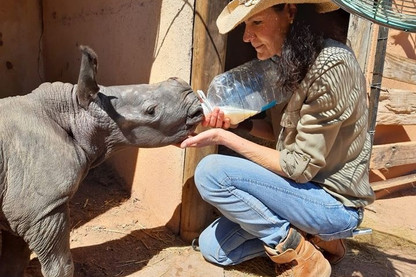Kalkfelders’ plead for rhinos
- 067triangle
- Oct 25, 2023
- 2 min read
“The very first rhino I received, was a black rhino heifer that was only seven days old. The vets brought her in and said there was only a 10% chance that she would survive.
“To me, where there is life, there is hope. By a miracle she pulled through and today she is 28 years old and she had 10 calves. She is pregnant with her 11th calf.
“This just shows you, by saving one, you can put so much more back into nature.”
This is the words of Anette Oelofse, who is involved in the conservation of rhinos and the raising of orphan rhino calves near Kalkfeld since 1995.
She and Alex Oelofse, owners of Mount Etjo Safari Lodge, have recently launched a public appeal to world leaders, in particular members of CITES, to rethink their choices when it comes to how to protect rhinos.
“All the countries that vote against African countries at CITES – they will be cause for the extinction of rhino’s,” Alex recently said in a video that was released on Youtube on Mount Etjo’s channel. The video was compiled by Reinhard Brönner from Redsand Films.
He explained statistics shows that at the current rate of poaching, there will be no more wild rhino’s left within the next 15 to 20 years.
“Bans on rhino horn trading, anti-poaching efforts and education of the consumers is not helping,” he said. The Oelofsens are advocating for legalizing trade in rhino horn as they believe that this will cause the illegal black market to collapse.
“You can cut the horn off a live rhino, without hurting it. So why not utilise the horn, legalize the trade and put it on the market? This way the market can be saturated and the rhino can be kept alive. In Southern Africa we have about 40 tonnes of rhino horns in storage – which can sustain the market over eight years, without touching a live rhino.
However, at the CITES convention applications for this legalization by countries such as Namibia, South Africa and Eswatini gets voted out by the 184 member states. Alex mentions that of these 184 members, only 11 has any rhino’s, while two has the majority.
“Sadly, the fate of the rhinos will be determined by those who have the least experience and knowledge, who are not actively involved in fighting this war,” he said.
The Oelofsens calls on world leaders, particularly members of CITES, to rethink their choices, to become more involved and take informed responsibility.



















Comments